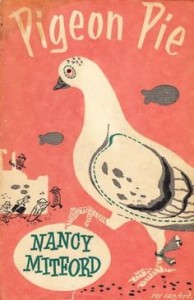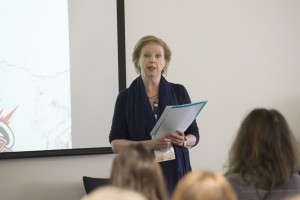The group was in fine form this Saturday as we met to discuss a ‘non-Waugh’ book for the first time. Original members have worked through nearly all Waugh’s fiction now, so we are looking for ways to branch out without losing the interest that binds us together – one way, we thought, was to read the writing of Waugh’s contemporaries and friends alongside his own work. Last month we looked at Put Out More Flags, so it made sense to keep the theme of early WWII and read Pigeon Pie, a relatively early novel by Waugh’s great friend Nancy Mitford.Pigeon Pie is a very light, silly book written during the so-called Phoney War. Its heroine, Sophia, is terrified of what is to come but determined to face it bravely. While her apocalyptic fears of bombs and rubble remain unrealised during the narrative, she does nevertheless stumble across various absurd wartime intrigues which she faces with characteristic British ‘pluck’.It looked at first as if Mitford was going to get a rough ride, with one member of the group complaining he was robbed of the penny he paid for the book on AbeBooks (though another member did point out that there was also the £2.80 delivery fee to consider). He then raised consternation by describing Mitford as a ‘silly little girl’ (she was in fact in her mid-thirties when she wrote Pigeon Pie), but quickly distanced himself from any misogynistic intent by explaining that the story read as if any sixth-former with a penchant for cheap spy novels could have written it.
Others liked the book’s determination not to take anything seriously, and occasionally Mitford’s satire can still bite. How marvellous, for example, to be reading her description of parliament as an extension of a Public School in the same week that newly-elected MPs from the Scottish National Party upset the decorum of the chamber by taking selfies in the Speaker’s chair and imitating David Cameron:
It was talk which Sophia was very much accustomed to, because it had begun years ago, when she was a young married woman taking Fred and Ned [members of parliament] out to tea at the Cockpit; only then it had been a question of Pop and coloured waistcoats, and the Headmaster in those days had delivered his harangues in Chapel instead of on the floor of the House.
Mitford, by virtue of her aristocratic (if eccentric) upbringing, was ideally placed to listen to the powers that be in the run-up to, and early stages of, the war. What she heard did not impress her and she compares not only MPs and ministers to children in the novel but countries too:
Rather soon after the war had been declared, it became obvious that nobody intended it to begin. The belligerent countries were behaving like children in a round game, picking up sides, and until the sides had been picked up the game could not start.
England picked up France, Germany picked up Italy. England beckoned to Poland, Germany answered with Russia. Then Italy’s Nanny said she had fallen down and grazed her knee, running, and mustn’t play. England picked up Turkey, Germany picked up Spain, but Spain’s Nanny said she had internal troubles, and must sit this one out. England looked towards the Oslo group, but they had never played before, except little Belgium, who had hated it, and the others felt shy. America, of course, was too much of a baby for such a grown-up game, but she was just longing to see it played. And still it would not begin.
The English character is far more stereotyped in this novel than in Put Out More Flags, but then Waugh always claimed not to believe in ‘the man in the street’ – only individuals. (An irony, then, that he has become the byword for a certain kind of Englishness). When this is riffed on, the effect is very funny – such as when a pro-German schedule of radio broadcasts only worries the authorities when its presenter (based on Ivor Novello) addresses the pets of Great Britain. Across the country dogs and cats gather round the wireless, and frogs jump out of garden ponds just to listen.
We wondered if, in the time of uncertainty and boredom in which Mitford wrote Pigeon Pie, accounted for its frivolity. There is nothing more British than using humour as a defence mechanism. It wouldn’t have been ‘done’ to show too much fear. This was reflected in the family experiences of group members – more than one grandmother had kept schtum on the emotional strain of wartime all her life only to be plunged into terror of planes and bombs by Dementia or an unexpected low-flying crop-sprayer. Thus, the parachutists that haunt Sophia are, when they arrive, easily and unfeasibly dealt with by tying their legs together with twine.
At our conference, Selina Hastings spoke at length about Waugh’s mentoring of Mitford – a master and pupil relationship that lasted 15 years. Many of us said they’d go on to read later Mitfords, to see if Waugh’s influence shows in the writing. Mitford seems on the verge of great comic literature in Pigeon Pie – maybe she just needed a push from an ill-tempered perfectionist.
See also In Search of Nancy





 Subscribe to Barbara Cooke's posts
Subscribe to Barbara Cooke's posts
What a great book group meeting this was! I really did enjoy diverting slightly to look at Nancy Mitford and I think it made for some really interesting discussions. Pigeon Pie had some great lines in it, my favourites being about tea as ‘a nerve tonic indispensable to the decadent English’ and ‘Wigless head on Kew Pagoda, Headless wig on Green’.
Something I didn’t get to mention on Saturday too was a reference Mitford makes to the Georgian Group when it seems for a moment that Sir Ivor’s house might be knocked down. This was a conservation group founded in 1937 with members such as Robert Byron, Osbert Sitwell and John Betjeman – it is still going today in fact!